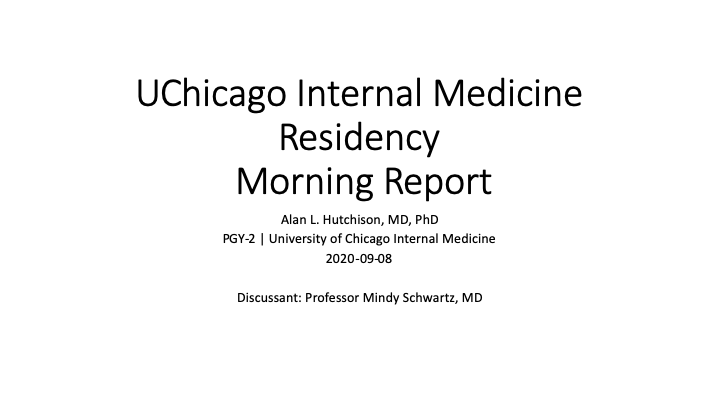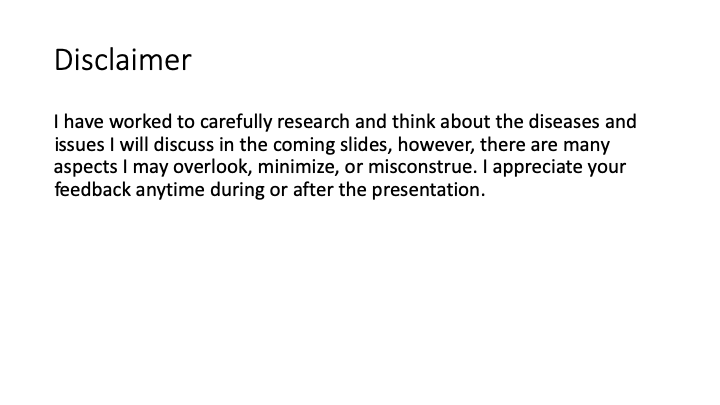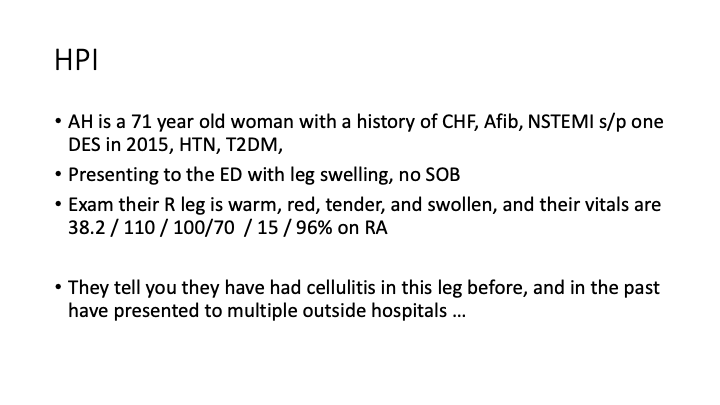
In March I presented @UChicagoMed Grand Rounds on my advocacy work on the soon-to-be-law Illinois Drug Reuse Opportunity Program (#IDROP) Act legalizing Prescription Drug Repositories. Since not everyone could make the talk, I wanted to introduce IDROP here. 1/45 

This journey started organically during my time @UChiPritzker volunteering at @connect2home and grew during my residency @UChicagoMed to a broad coalition of physicians, pharmacists, free clinics, and community activists, hopefully signaling a new avenue for affordable meds. 2/45 

I want to talk about medication waste, the positive impact of Prescription Drug Repositories, and what the next steps are in Illinois. 3/45 

Illinoisans lack access to affordable medications, as we see from this study from Altarum @HealthValueHub. 4/45 

The US HHS CDC National Center for Health Statistics @NCHStats has a troubling report about the degree of medication non-adherence caused by prescription drug costs. 5/45 

A NBER paper from @amitabhchandra2, Evan Flack, and @oziadias highlighted that drug costs increase mortality. nber.org/papers/w28439 6/45 

Here are some failures in our health-care safety net. Statistics are important, but these big issues have real effects on patients we see every day. 7/45 

Med waste is an often-ignored issue. The degree of waste is staggering, and the amount of $$ spent on proper disposal of meds (via incineration) is quite high. We have good data from CO, which we can then extrapolate for states such as IL. To incinerate 1 pound costs $1-3. 8/45 

Unfortunately many medications are instead flushed into our waterways, where they are poorly processed by water filtration plants, instead ending up in our drinking water. pubmed.ncbi.nlm.nih.gov/28040194/ 9/45 

Take-back programs are one solution to the pollution of unused medications, but this approach doesn’t actually end up helping patients, unlike Prescription Drug Repositories. 10/45 

Many free clinics, such as @connect2home, rely on donated medications and supplies to treat their patients. 11/45 

In Illinois, 50 free and charitable clinics serve >100,000 patients and dispense almost 100,000 prescriptions free of charge. @ILFreeClinics 12/45 

They have several strategies for obtaining medications, but one of them is to just buy the medications for their patients outright. 13/45 

During my time volunteering, it made me wonder what the legal framework was that these donations were taking place under... 14/45 

This is where I learned that in Illinois there wasn’t a legal framework for the donation of medication! 15/45 

In 38 states in the nation, this legal framework exists and is incorporated as Prescription Drug Repositories, where donated medications are catalogued and inspected for safety, and then redistributed by request to other pharmacies or directly to patients. 16/45 

Some states require meds stay w/i the chain of custody. Meds held @ a central pharmacy & distributed daily, such as @ a nursing home, are destroyed if a pt stops taking them due to side effects. Instead, the repository can determine their suitability for redistribution! 17/45 

Some states, including soon Illinois, also allow for individual donors to donate medications, provided the meds are in tamper-evident packaging. Thanks to @shirlywhirlmd for allowing me to adapt her comics. 18/45 

Tamper-evident packaging includes unopened bottles protected by plastic wrap, syringes in plastic packaging, and medications in blister packs. Medications that have been opened are not eligible. 19/45 

Controlled substances, such as opioids, are not eligible. Take unused opioids to give-back sites for proper disposal. Cook County Sheriff’s Office @CCSOPIO has a robust program, cookcountysheriff.org/rx/home/ & other locations can be found here: cookcountymeds.org 20/45 

Other requirements for eligibility include being inspected for safety and tampering by a pharmacist, and being more than 6 months from expiration. 21/45 
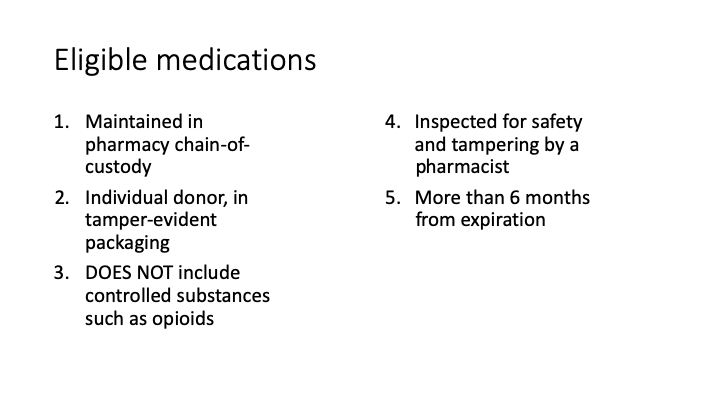
So how does a pt learn about this opportunity for affordable meds? Once a provider identifies a pt may not be able to afford their meds, they can reach out to a repository to see if any meds available. I adapted this @shirlywhirlmd comic to aid in demonstrating this. 22/45 

Prescription Drug Repositories are legalized in states throughout the country, and both @ASCO and @AmerMedicalAssn have released statements in support of medication donation, re-use, and re-distribution. 23/45 

See the response below for the continuation of the thread, where we explore examples of successful repositories and what we can look forward to in Illinois!
In Iowa, @SafeNetRX has been operating since 2007, and has done an incredible job providing meds to patients in need. 24/45 

Nationally, @sirum facilitates legalization and implementation of repositories, including helping operate mail-order repository pharmacies. 25/45 
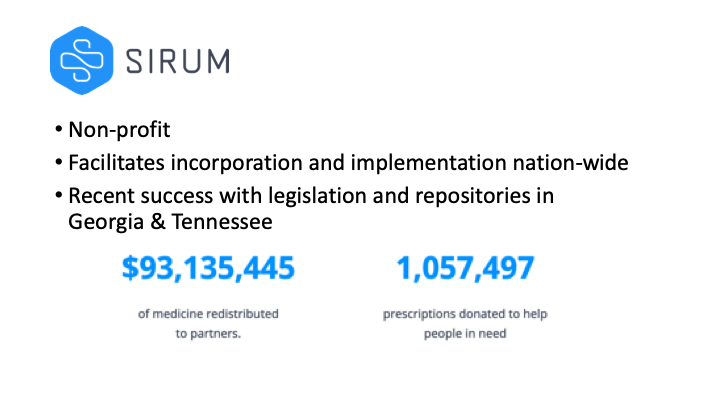
In IL, Twelve Baskets Full operated a repository that accepted and inspected donations, but sent them overseas on mission trips. Unneeded meds are sent to SafeNetRx in IA. This labor of love by Dr. Roderick Matticks closed due to the pandemic. 26/45 

A reminder that Cook County, Chicagoland, and the State of Illinois are several times larger than Iowa, which means the opportunity for positive impact is many times greater. 27/45 

These programs are paid for in a number of ways. Funds are for physical space for the pharmacy, to hire pharmacists and techs, as well as bookkeeping infrastructure. One way is by grant donations, such as from @RWJF, which has donated to @sirum. 28/45 

A second is by institutions paying to have the medications donated, usually for less than what it would cost to safely dispose of the medication. 29/45 

The third option is that a receiving institution, such as a hospital or free clinic, pays a lump sum per month or per prescription in exchange for access to the supply of medications at the repository. 30/45 

It turns out those failures of the health safety net we discussed before were actually successes of prescription drug repositories! Insurance lapses, insurance denials, temporary medication requirements, and overly-expensive medications all solved by repositories. 31/45 

It’s important to note that this kind of medication donation and re-distribution is already happening, but instead of in a formally organized fashion, it is happening at the patient-to-patient and provider level, as seen in this tweet by @IBDMD 32/45 

Legalization requires modification to Good Samaritan laws. Trial lawyers have previously opposed these changes, even tho in 14 years of donation there has never been an adverse effect due to a med being donated. With discussion they were convinced to be neutral this year. 33/45 

I wanted to briefly describe my role with this legislation, hopefully as an example for others. 34/45 

It started off with a tweet I wrote when I chose this project for my @CGIU Conference project in 2018, which @EALindquist saw and cold-emailed me about forming a coalition, which led to a meeting in the Bar Louie by UIC with @sweetchinchilla & Levi Moore 35/45 

A fellow med student, @nikitadeshpan & I wrote a Commentary for the ChicagoTribune, and I traveled to Springfield to testify with @sweetchinchilla, which was picked up by NPR Illinois. Special shout out to @jeannemfarnan for excusing me from class. 
https://twitter.com/jeannemfarnan/status/1110694466728398848?s=2036/45
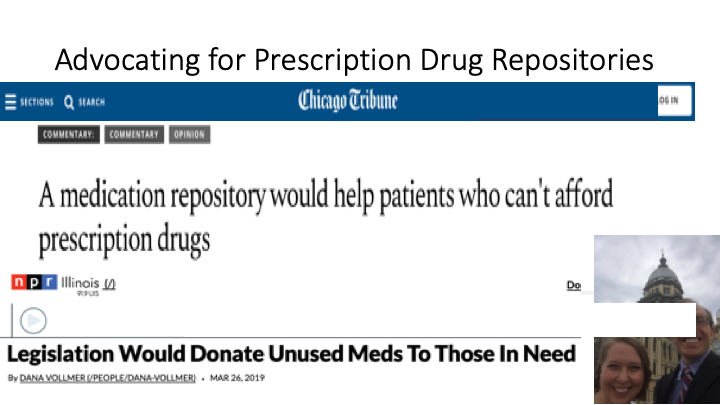
Through our efforts we built a large coalition of support! @AmericanCancer @ILFreeClinics @IL_Oncology @ilenviro @CrohnsColitisFn @ACPinternists @sirum 37/45 

The Illinois Drug Reuse Opportunity Act (IDROP), HB119/SB516, was introduced by @WillGuzzardi and @Citizens4Karina. It allows individual donation, includes Good Samaritan protections, requires pharmacist inspection, and does not provide state money to set up a repository. 38/45 

Expertly shepherded by @WillGuzzardi & @Citizens4Karina, #IDROP unanimously advanced out of every committee it met, and I was lucky enough to be present for each meeting! Now it’s headed to @GovPritzker, we’re looking forward to him signing it! 39/45 

This bill would not have passed without the public support of so many providers filling out witness slips to support the bill. They are filed in advance of committee hearings. Simple as “Record of Appearance Only” adding your name to a list, or as complex as oral testimony. 40/45 

Special thanks to those who made witness slips, including @IBDMD, @sbhkelly, @SilverRubin , @vgpress13 @nkong_med @annavolerman @DavisAmd @jtalexa @JOylerMD @Mim_Ari @ms47_mindy @DrMonicaPeek @monicavelaw @SDShahMD @MarshallChinMD @nedalai @adamcifu @albina_tyker @JuliaBNath
If you have legislation to advance, it’s important to keep in mind that politicians want to do the right thing & be re-elected. You also need to find someone who will really champion your legislation against opponents. @Will and @karina fit the bill (pun intended)! 42/45 

On Jan 1, 2022, #IDROP will become law. We will be able to partner with mail-order repositories nationally soon after to get medications to patients, but we will have to decide if we will establish our own physical repository in Illinois, which would require $$. 43/45 

I could not do this work without so many people, from helping me spread awareness at Grand Rounds to advocating & designing the legislation. Special shout out to @monicavelaw for teaching me as a first year student advocacy could & should be part of being a physician! 44/45 

Please let me know what questions you have, about advocacy, about donating medications personally or as an institution. There is still a lot of work to do to help our patients! 45/45 

• • •
Missing some Tweet in this thread? You can try to
force a refresh


